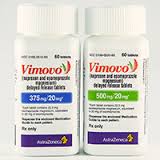Vimovo combines an antacid and pain-reliever in one medication. Unfortunately, both ingredients are associated with severe kidney inflammation, also known as acute interstitial nephritis.
What You Can Do & How We Can Help
The Schmidt Firm, PLLC is currently accepting Vimovo induced injury cases in all 50 states. If you or somebody you know has been diagnosed with acute interstitial nephritis, you should contact our lawyers immediately for a free case consultation. Please use the form below to contact our Defective Drug Litigation Group or call toll free 24 hours a day at (866) 920-0753.
What is the problem?
Vimovo contains the anti-heartburn drug esomeprazole, also known as Nexium. It is a member of the Proton-Pump Inhibitor (PPI) class. Unfortunately, all drugs in this class are associated with acute interstitial nephritis.
FDA Updates Vimovo Warnings
The first case reports linking PPIs and nephritis were published in the 1990s. Since then, hundreds of cases have been reported. It was not until December 2014 that the FDA updated the label on Vimovo to include acute interstitial nephritis.
What is Acute Interstitial Nephritis?
Kidney inflammation of the interstitial tissue, which is located in the spaces between tubules. It causes severe swelling and enlargement of the kidneys, which impairs kidney function.
What is the risk?
In 2015, CMAJ Open published a study linking PPIs with a tripled increased risk of acute interstitial nephritis. For every 1,000 patients who took a PPI for one year, 13.5 were diagnosed with acute interstitial nephritis.
Nephritis is a relatively rare side effect of Vimovo, but it often causes permanent kidney damage. The risk increases for patients who are over 65, especially those with high blood pressure or other risk-factors for kidney disease.
Warning Signs of Nephritis
- Fever
- Urine has blood or pus (may be pink or cloudy)
- Urinating frequently or very little
- Rash
- Swelling due to fluid-retention
- Nausea, vomiting
- Fatigue
- Joint pain
- Pain in the abdomen, back, kidneys, or pelvis
- Confusion
How is Interstitial Nephritis Treated?
Patients must stop taking Vimovo and go to the hospital, where they will typically receive anti-inflammatory corticosteroid medications, intravenous (IV) fluids, and pain-relievers. If the kidneys have stopped working, the patient may require dialysis to clean their blood. Left untreated, nephritis can cause kidney failure.
Do I have a Vimovo Lawsuit?
The Schmidt Firm, PLLC is currently accepting Vimovo induced injury cases in all 50 states. If you or somebody you know has been diagnosed with acute interstitial nephritis, you should contact our lawyers immediately for a free case consultation. Please use the form below to contact our Defective Drug Litigation Group or call toll free 24 hours a day at (866) 920-0753.
Attention Lawyers: We consider a referral from another law firm to be one of the greatest compliments. If your firm is interested in referring us a case or for us to send you a list of previous award judgments and/or average referral fees, please visit the Lawyer Referral section of our website.


 The Schmidt Firm, PLLC has been recognized as one of the nation’s leading plaintiffs' law firms and handles cases in all 50 states. We are very proud of our legal achievements, but equally self-respecting of our firm's reputation for providing personal attention to each and every client we represent.
The Schmidt Firm, PLLC has been recognized as one of the nation’s leading plaintiffs' law firms and handles cases in all 50 states. We are very proud of our legal achievements, but equally self-respecting of our firm's reputation for providing personal attention to each and every client we represent.

